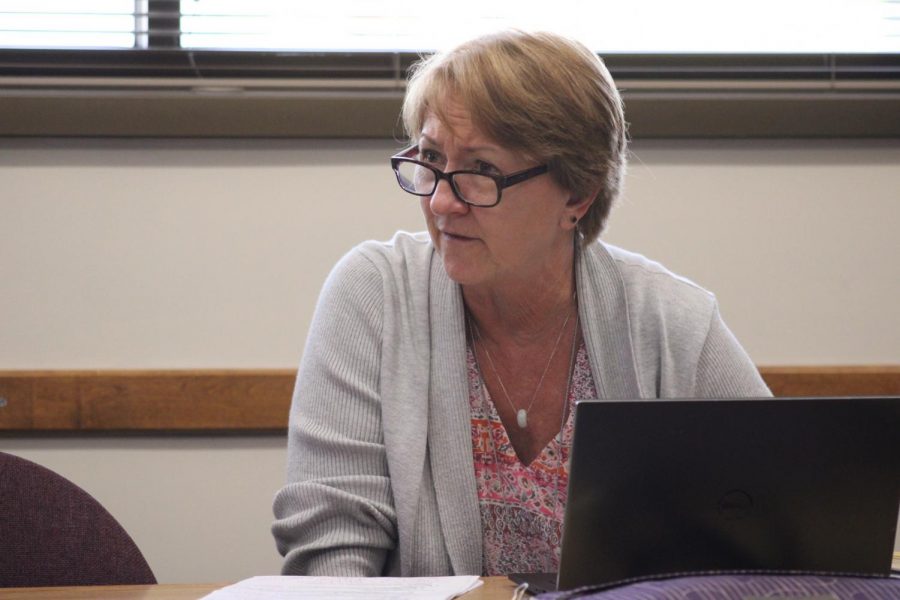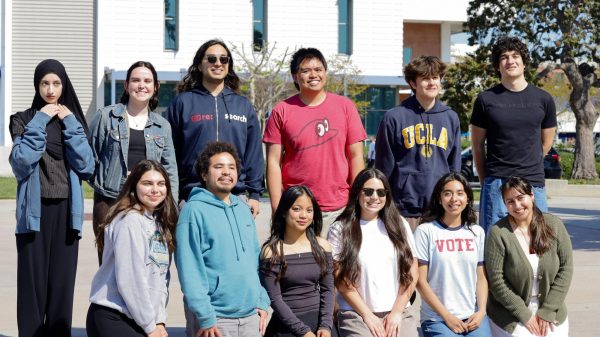Students may be elligible for academic renewal after one year with new policy change
Jean Shankweiler, vice president of Academic Affairs, explains an administrative policy at a College Council meeting on Monday, Sept. 16. The Council approved Administrative Policy 4240, which lessens the amount of time a student has to wait to be eligible for academic renewal. Jaime Solis/The Union
Failing grades may soon be excluded from a student’s GPA after one year with the approval of a new academic policy change, officials said.
The College Council approved a change to Administrative Procedure 4240 (AP 4240) on Monday, Sept. 16, which reduces the amount of time necessary for students to be eligible for academic renewal from two years to one year.
Academic renewal is a process students can petition for to have substandard grades be disregarded when factoring GPA. If a student has at least a 2.5 GPA in the last 24 units they have taken, they can petition for academic renewal, according to AP 4240.
However, a student also has to wait two years after the substandard grades were received. With the College Council approving this new change, students might be eligible after one year.
“By reducing that time to wait, it’s going to hopefully allow students to shorten their time here,” Vice President of Academic Affairs Jean Shankweiler said. “College is expensive. The less time you spend here, the less time you’re spending on your education.”
Shankweiler also said academic renewal, while it excludes substandard grades from being factored in GPA, it does not remove them from student transcripts.
For students who may have found their first few semesters at ECC difficult or had outside responsibilities get in the way of school, academic renewal can raise their GPAs, Kelsey Iino, an ECC counselor, said.
Iino, who is also the president of the ECC Federation of Teachers Union and motioned to pass the administrative policy change at the College Council meeting, said this can make or break an admissions decision for a student applying to a four-year university.
“I think it’s very important considering we are a two-year college, and also [for] UCs and Cal States, you must apply one year in advance,” Iino said. “So someone that’s waiting two years to be eligible for a UC or Cal State, it may prolong their ability to transfer because of their substandard grades.”
Since the requirements to be eligible for academic renewal include having a 2.5 GPA in the last 24 units taken, Iino said students may not need two years to complete that course load.
“A student can do 24 units in one year. They don’t need to take two years to do the 24 units,” Iino said. “It just means you’re not waiting around on campus for an extra semester because you’re not eligible for academic renewal.”
Iino related back to her own experience in college and how she also petitioned for academic renewal. Had she not, she said her GPA would have been substantially lower and that could have compromised admissions decisions for her.
“It just makes me identify that people make mistakes,” Iino said. “There are so many reasons why you’d get a substandard grade in a term or multiple terms.”
Iino added that fellow counselors have been eager for this academic policy change to be enacted because it supports students. In order to be fully established at ECC, the Board of Trustees will have to approve the item in its next meeting.
“It should be a slam dunk,” Iino said. “I don’t know why anyone that works on campus would be like, ‘No, keep it for two years.’”
Cindy Lopez, a library media technician at the Schauerman Library and president of El Camino Classified Employees Union, seconded the motion to approve AP 4240 and said it promotes a second chance for students.
“I support what Kelsey [Iino] advocates for,” Lopez said. “I believe in second chances. I think if anything this allows students who are not given resources at the beginning to maybe have a do-over.”
Many students come from disadvantaged backgrounds and those factors may play a role in their academic performance, Lopez said.
Academic renewal is a powerful tool to give students who may come from a disadvantaged background an opportunity to move on to the next level, she added.
“I seconded because it then goes on record, the people behind it—not that everybody else wasn’t but that was important for me because voices need to be heard,” Lopez said. “Not just ours as classified, as faculty, as members of this community, but students need to be heard.”








